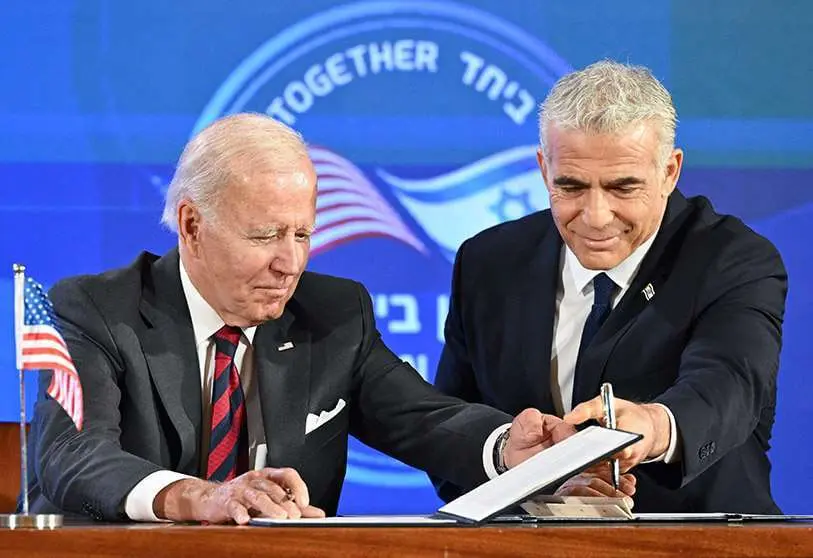Lapid and Biden discuss about the Iran nuclear deal

The nuclear deal with Iran is already a countdown, as evidenced by Israel's latest efforts to avoid it. A concern that acting Israeli Prime Minister Yair Lapid conveyed to US President Joe Biden in a phone call on Wednesday.
According to the prime minister's office, in the 45-minute call the two leaders spoke "extensively" about the negotiations before the agreement and the "shared commitment to stop Iran's progress towards nuclear weapons". In this sense, and according to the basis of the agreement, Iran will not be allowed to enrich uranium above 20% or stockpile more than 60%, with the aim of ensuring that the Islamic Republic does not have a nuclear weapon at its disposal.

And by diminishing Iran's potential, so would the threat it poses in the region, Israel's main concern. Iran's "terrorist activities in the Middle East and beyond", as Lapid described it in his call with Biden, from which the prime minister made one thing clear: Biden stated that the US would not compromise on issues unrelated to the content of the agreement, such as the removal of the Islamic Revolutionary Guard Corps from the list of terrorist groups and the detention of the International Atomic Energy Agency (IAEA) in Iran.
Yair Lapid also thanked the US for its latest strikes in Syria, which killed four Iranian-backed militiamen. For his part, according to Lapid, Biden 'underlined his deep commitment to the security of the State of Israel, and to preserving Israel's ability to deter its enemies and defend itself against any threat'. In this regard, both leaders mentioned Israel's freedom to protect itself from Iranian threats, something that has been stressed by Israeli leaders in recent weeks.

The urgency of the call with the US leader was prompted by the rapid progress of the EU's 8 August draft, which Israel called "unacceptable". The EU's High Representative for Foreign Policy, Josep Borrell, said he was hopeful that this agreement with Iran could be signed "in the next few days", following recent positive developments. A statement also echoed by White House National Security spokesman John Kirby: "We are closer now than we have been in some recent weeks and months".
However, not everything has been decided. Iranian Foreign Minister Hossein Amir-Abdollahian called for more guarantees from the US and an end to IAEA investigations, something Western leaders are unwilling to agree to. This demand was also made earlier this week by Iranian President Ebrahim Raisi himself.

In the meantime, Israel is taking advantage of the countdown to prevent the agreement. Lapid's call is just one more attempt, following the visit of Israeli Defence Minister Benny Gantz and National Security Advisor Eyal Hulata to Washington to keep up the pressure. In this regard, Mossad chief David Barnea is expected to visit the US capital to intensify Israel's engagement, and Prime Minister Lapid is expected to visit Germany and the United Nations General Assembly in New York, where he will seek an audience with Joe Biden.
The latest bilateral talks have also prompted a visit by US Assistant Secretary of State for Near Eastern Affairs Barbara Leaf to Israel to meet with officials between 29 August and 4 September, when she is also scheduled to visit Tunisia, the West Bank and Jordan.
Americas Coordinator: José Antonio Sierra.








